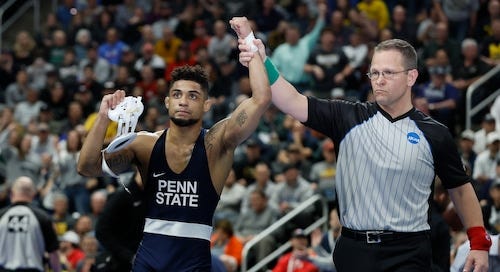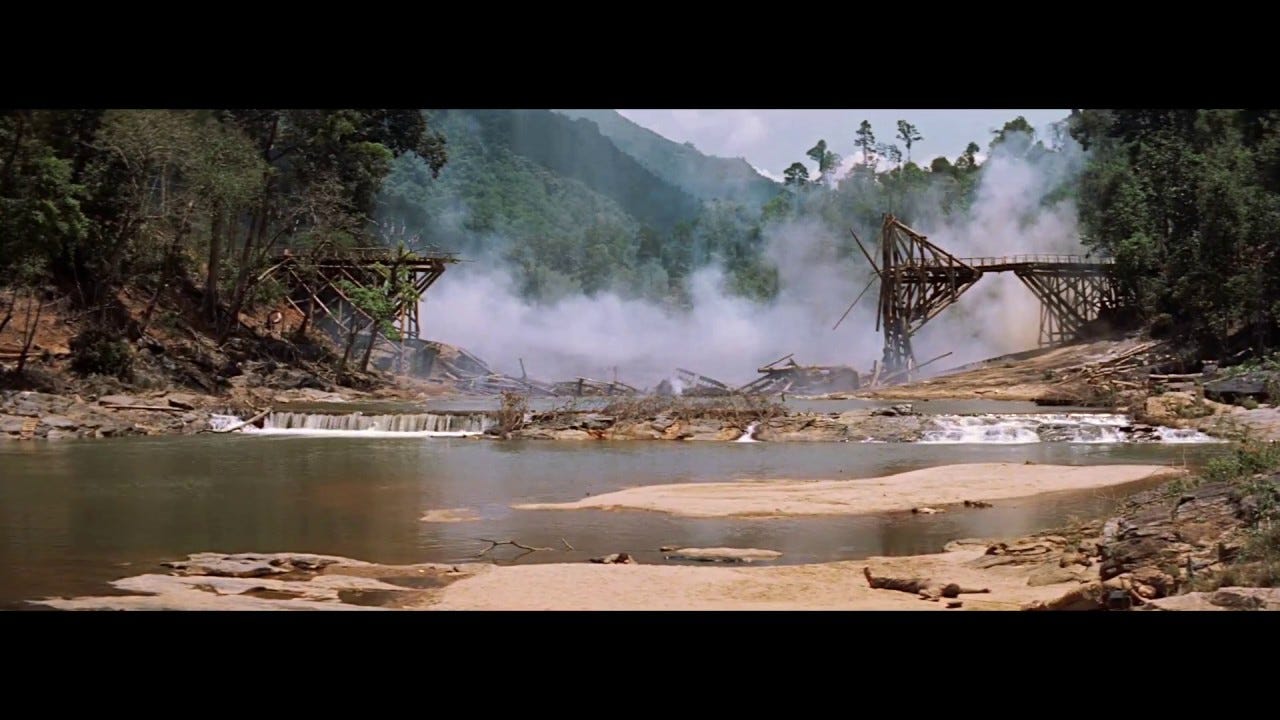I recently watched the film The Bridge on the River Kwai for the first time (hot take: it’s good). A quote near the end of the movie stuck out to me:
You make me sick with your heroics! There's a stench of death about you. You carry it in your pack like the plague… And with you it's just one thing or the other: destroy a bridge or destroy yourself. This is just a game, this war?!
In the scene, one soldier is berating the other for being reckless, for putting his life at risk carelessly. To make his point, he sarcastically asks if war is “just a game.” The question is meant to be ridiculous because they’re in a life or death situation.
But how often do we contend that lesser scenarios cannot be treated as games? How often do we say that something is “real life” and “must be taken seriously”?
And how often are we wrong?
Wrestling Free
In a qualitative methods course I took this summer, I spent some time learning how to conduct research interviews. My final interview was with another student in the class who had been a wrestler at IU. Among other things, we talked about how the best college wrestlers compete “freely,” without pressure.
The center of “free wrestling” is at Penn State. There, coaches don’t scream instructions during matches, they sit silently and observe. They avoid using language that is future-focused. They only talk about the process of wrestling and only consider immediate objectives.
All of this is intended to reduce pressure. If something goes wrong in a competitive atmosphere, it’s easy for your next thought to be “how do I make up for that mistake?" or “how am I going to overcome the deficit that I am in now?”
This sort of thing happens in other sports when you strike out four times in a game, miss six free throws, or drop every pass thrown your way. A sequence of failures builds up a kind of karmic debt that many of us feel pressure to overcome.
Where does the pressure come from? I’d contend that it comes from our expectations of external perception.
We get anxious after failures because we know that there are witnesses to that failure. Other people saw us fail, so now we need to succeed in order to prove to them that we aren’t losers. We need to show those people that we are valuable.
The “them” in this case could be friends, family, or authority figures. Even if no one is around, we may worry about how we would be perceived if there were others present.
Wrestlers struggle to compete without pressure because competition is a public act. Any failure can be perceived as a personal shortcoming, a verdict about their past, a referendum on their future. A sport that someone first participated in because they loved it, because it brought them joy, can quickly become a doleful obligation that one pursues in order to manage how they are externally perceived. You wrestle so that people will call you a “winner,” not a “quitter.”
If you are worried about your identity, how every possible scenario will reflect on you, whether any success or failure will change how you are perceived, how can you possibly wrestle free? How can you focus on succeeding in the moment when pressure converges on you from the past and the future?
Penn State’s answer is to embrace a zen-like devotion to the moment. By minimizing language about athletes’ past performance or future hypotheticals, they allow competition to feel more like an individual challenge instead of a group endeavor in which you can let down your team, as if to say:
Nobody is watching you. Your success or failure are irrelevant. This moment is a single challenge which you must take seriously. There will be more challenges in the future, but they have no bearing on you. You have had successes and failures in the past, but nobody remembers them, and neither should you.
Wrestling free means wrestling like you are alone, like no one will ever watch or care. You compete in the same way that someone sitting at a table by themselves competes with a puzzle. You compete simply to embrace the joy of the challenge.
So what does all that have to do with grad school?
Deception and Self-Deception
When you are accepted to a graduate program, one of the first questions you’ll get from other people is “What are you going to do with that?” Hopefully this isn’t asked in a hostile way, but it’s still going to orient your educational project toward some future end.
Similarly, when I showed up to my Ph.D. program, people almost immediately started asking me what I research and what my dissertation would be on. The reality was I didn’t research anything; I’d just gotten there. And even if I had ideas about what I might like to write a dissertation on, I expected to change my mind as a product of the program I was about to begin.
Most of us, then, choose to respond to this stressful dilemma by trying to deceive our peers into believing that we know what we are doing.
I told people that I was focused on institutional research, angling towards comparative curricular quantification, seeking a metricization of missional alignment with course construction philosophy.
The problem was that none of that means anything.
Academic language is often used out of fear. It’s about the fear of being exposed as a fraud, as an imposter. We use long words that we might understand in novel combinations to sound like we know what we’re doing. Because the real fear is being shown to be as incompetent as we feel.
Other grad students accept our deceptions because they also hope to deceive us. We wink at one another, pretend to understand what the other is saying, sigh deeply at the weight of our rumination, and then move on.
The ultimate outcome of this pattern of deception, however, is self-deception. You can forget that you are pulling the wool over others’ eyes and pull it over your own. We all have to present ourselves as more competent than we feel, but believing in the narratives you use to deceive other people can lead to a very fragile sense of self.
Because the second you are proven wrong, you become undone.
You become undone because deception heaps pressure on your own head. You create pressure from the past, pretending to be a “researcher.” From your first day in class, you create more pressure by needing to live up to the narrative you’ve presented yourself with, to be as smart as you’d like other people to think you are.
You also face pressure from the future. If you tell people what kind of scholar you’ll be, what kinds of things you’ll write, and what a great agent of change you’re going to be, the pressure to start achieving those inflated goals only grows with time. The future bears down and every moment that you are not meeting the elevated expectations you have set for yourself, you are failing.
Wrestlers compete under pressure when their past record and their future hopes make it impossible to focus wholly on the task at hand.
Graduate students work under pressure when the expectations of others and the expectations they’ve inflated for themselves make the present moment a means to an imagined end instead of an end in itself.
Studying free
I want to try to do things differently now. I am no longer a scholar of anything. I have no philosophical framework. I do not know what I will write my dissertation about. I do not know what I am going to be when I grow up.
Of course, this is partly a lie.
I have plenty of ideas, plenty of interests, plenty of goals. A wrestler who wrestles free still wants to win the tournament, still wants to go on to bigger and better things, still has preferred outcomes.
But that is no longer the language I want to use for myself. The more I disclose those things to myself and allow others to reinforce them, the more I operate under pressure, the more my study becomes a “means to an end.” When I am studying for the sake of studying, I study better.
The irony here is the being “free” of pressure is also an example of self-deception. Instead of tricking yourself into believing in your competence, you are tricking yourself into believing that your long-term goals are not salient to your present experience.
The difference, perhaps, is which form of self-deception is healthier. I am fully aware that what I am doing presently in graduate school will have a material impact on what I do afterwards. The issue is that I don’t really know what kind of impact it will have. There is no way to control the outcome, so focusing on it just turns into worrying about it.
By focusing on my present studies as an end to themselves, I can be led only by my curiosity. I will study the things I care about because they are worth caring about. I will write the kinds of things I think are interesting, not the kinds of things I expect someone else to publish. I will endeavor not to present a false competence because that will become a competence I feel compelled to justify.
Every day in graduate school is a singular challenge. I want to accept it on its own terms and seek to grow from each contest. I do not want to grow toward something, but to grow for the sake of growing.
And, perhaps, when I look back on these years of small contests, I’ll have become more like the person I want to be. I have no idea whether that will include the kind of job I hope to be doing, but that’s something I can’t control anyway.
So I’m trying not to think about it too much right now.
-Matt






That is why I like how SJC hides the grades. It helps students like me seek learning for its own end, not what I will produce. I feel like grades play into that whole pressure concern.